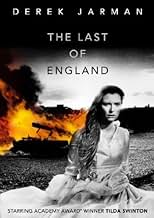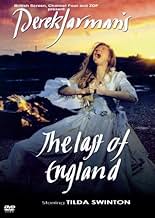VALUTAZIONE IMDb
6,4/10
1583
LA TUA VALUTAZIONE
Derek Jarman lavora nella sua casa di Londra; l'Inghilterra imperialista e l'infanzia in vecchi Super8; un giovane fa uso di droga; un matrimonio simbolico; la guerra delle Falklands; una cu... Leggi tuttoDerek Jarman lavora nella sua casa di Londra; l'Inghilterra imperialista e l'infanzia in vecchi Super8; un giovane fa uso di droga; un matrimonio simbolico; la guerra delle Falklands; una cupa meditazione sulla Londra tatcheriana.Derek Jarman lavora nella sua casa di Londra; l'Inghilterra imperialista e l'infanzia in vecchi Super8; un giovane fa uso di droga; un matrimonio simbolico; la guerra delle Falklands; una cupa meditazione sulla Londra tatcheriana.
- Premi
- 4 vittorie totali
'Spring' Mark Adley
- Spring
- (as Spring)
- …
Jonny Phillips
- Various roles
- (as Jonathan Phillips)
Nigel Terry
- Narrator
- (voce)
Derek Jarman
- Self
- (non citato nei titoli originali)
Recensioni in evidenza
Jarmen manages to create a world stinging from Thatcherite policies, with viscious imagery burning on the screen. If you want an indictment of the eighties without irony loaded sentimentality or crass stereotypes, then experience The Last of England.
Challenging the politics of 80s Britain and the film-making of the time, The Last of England stands out as an outstanding cinematic achievement.
Don't get me wrong, when I first watched, I found it difficult to watch and actually left before it finished! But it drew me back. I did some reading on the film and on Derek Jarman and after this I was able to see the Genius in the piece.
The main character is Spring. (we do not learn this is his name until the end credits) He portrays the working class outsider in Thatcher's Britain. There are scenes of destruction, the end of industry, the feeling of terror brought on by the IRA at the time. The film challenges the Taboo's of homosexual relationships, forbidden love, drug use etc etc Through montage, still images, music and voice over, Jarman portrays his feelings of Britain in the 1980s and how he would like to sail away from this terrible Island (see the final sequence) Shot on 8mm, Jarman was revolting against the Hollywood standard 35mm, using home video footage on top to garnish the effect.
Really before you see this film, you MUST do some reading into it first. I believe this will enhance your enjoyment and let you get a flavour of what Jarman was trying to do with this piece
Don't get me wrong, when I first watched, I found it difficult to watch and actually left before it finished! But it drew me back. I did some reading on the film and on Derek Jarman and after this I was able to see the Genius in the piece.
The main character is Spring. (we do not learn this is his name until the end credits) He portrays the working class outsider in Thatcher's Britain. There are scenes of destruction, the end of industry, the feeling of terror brought on by the IRA at the time. The film challenges the Taboo's of homosexual relationships, forbidden love, drug use etc etc Through montage, still images, music and voice over, Jarman portrays his feelings of Britain in the 1980s and how he would like to sail away from this terrible Island (see the final sequence) Shot on 8mm, Jarman was revolting against the Hollywood standard 35mm, using home video footage on top to garnish the effect.
Really before you see this film, you MUST do some reading into it first. I believe this will enhance your enjoyment and let you get a flavour of what Jarman was trying to do with this piece
Reading the comments on this film or others like it is a frustrating experience, because so many people don't seem to be clear on the concept. Let me put it very simply:
This. Is. Not. A. Narrative. Film.
If you're going to complain about lack of a plot, character development, or other features of narrative films, don't go see a non-narrative film! It's an entirely different experience, and that's the whole idea. Judging an experimental montage of images and music and voice by the standards of a conventional narrative film is ridiculous -- like complaining about a drama because it wasn't funny. It's not SUPPOSED to be. If you don't like films that don't have a conventional narrative, don't see them.
So, for those who DO actually like experimental, non-narrative film, I'd highly recommend this one -- it's one of my all-time favourite films of any sort, even though know the majority of the population probably couldn't sit through it. I found it incredibly powerful, evocative and visually stunning, and even 15 years after seeing it, some images from it are still burned into my mind. I'm a big fan of Jarman's work in general, but if I had to pin down one single favourite from his work, I think this would be it.
This. Is. Not. A. Narrative. Film.
If you're going to complain about lack of a plot, character development, or other features of narrative films, don't go see a non-narrative film! It's an entirely different experience, and that's the whole idea. Judging an experimental montage of images and music and voice by the standards of a conventional narrative film is ridiculous -- like complaining about a drama because it wasn't funny. It's not SUPPOSED to be. If you don't like films that don't have a conventional narrative, don't see them.
So, for those who DO actually like experimental, non-narrative film, I'd highly recommend this one -- it's one of my all-time favourite films of any sort, even though know the majority of the population probably couldn't sit through it. I found it incredibly powerful, evocative and visually stunning, and even 15 years after seeing it, some images from it are still burned into my mind. I'm a big fan of Jarman's work in general, but if I had to pin down one single favourite from his work, I think this would be it.
This is the sort of movie which is usually defended with a phrase such as 'Oh you clearly didn't understand' or 'It's narrative is too unorthodox'. The sad fact is the film's limited distribution is due to its own wretched pretensions rather than its intelligence. A barrage of depressing images (man shoots up, man humps portrait of woman and so on) and an endless meandering dialogue is not enough to make a film involving. Jarman's intention is clear, Thatcher's Britain was every bit as horrible as it is shown to be here but surely there were better ways to articulate that. His work remains infuriating rather than involving and for that reason alone this film must be judged a failure.
Derek Jarman has drawn his title and theme from the Ford Maddox-Brown pre-rafaelite masterpiece "The Last of England" painted in 1855.
The film is a blast of fury against Thatcherism and all its crypto moralistic tripe. Jarman is angry - REALLY angry about the state his country has been reduced to by the conservatives and all their works. This is an amplified echo of the painting, where the English couple and their baby set off on a ship and leave England for the last time. They are resigned to their fate. Jarman it seems, is resigned to his, but he isn't going quietly.
The Last of England is a mess. A disjointed ugly collection of impressions. A nasty kaleidoscope which is difficult to enjoy. However, when one moves away from searching for a narrative it gets easier.
The things we recognise are soon twisted and used against us and it's unsettling. This is all deliberately arranged to elicit a response in the viewer. Some will be appalled, but some won't get it. This encapsulates Jarman's view of England in 1987 and it's not pretty.
As the film closes out we see Jarman return the story to its source and we sense a final regret that there is no going back.
The film is a blast of fury against Thatcherism and all its crypto moralistic tripe. Jarman is angry - REALLY angry about the state his country has been reduced to by the conservatives and all their works. This is an amplified echo of the painting, where the English couple and their baby set off on a ship and leave England for the last time. They are resigned to their fate. Jarman it seems, is resigned to his, but he isn't going quietly.
The Last of England is a mess. A disjointed ugly collection of impressions. A nasty kaleidoscope which is difficult to enjoy. However, when one moves away from searching for a narrative it gets easier.
The things we recognise are soon twisted and used against us and it's unsettling. This is all deliberately arranged to elicit a response in the viewer. Some will be appalled, but some won't get it. This encapsulates Jarman's view of England in 1987 and it's not pretty.
As the film closes out we see Jarman return the story to its source and we sense a final regret that there is no going back.
Lo sapevi?
- ConnessioniEdited from The Queen Is Dead (1986)
- Colonne sonoreRefugee Theme
Written by Barry Adamson
Performed by Barry Adamson & Martin McCarrick (as Martin Micarrick)
Produced by Barry Adamson
Barry Adamson appears courtesy of Dying Art Ltd
® & © Dying Art Ltd 1987
I più visti
Accedi per valutare e creare un elenco di titoli salvati per ottenere consigli personalizzati
- How long is The Last of England?Powered by Alexa
Dettagli
- Data di uscita
- Paesi di origine
- Lingua
- Celebre anche come
- Ciò che resta dell'Inghilterra
- Luoghi delle riprese
- Aziende produttrici
- Vedi altri crediti dell’azienda su IMDbPro
Botteghino
- Budget
- 276.000 £ (previsto)
- Lordo in tutto il mondo
- 630 USD
- Tempo di esecuzione
- 1h 32min(92 min)
- Colore
- Mix di suoni
- Proporzioni
- 1.66 : 1
Contribuisci a questa pagina
Suggerisci una modifica o aggiungi i contenuti mancanti


























